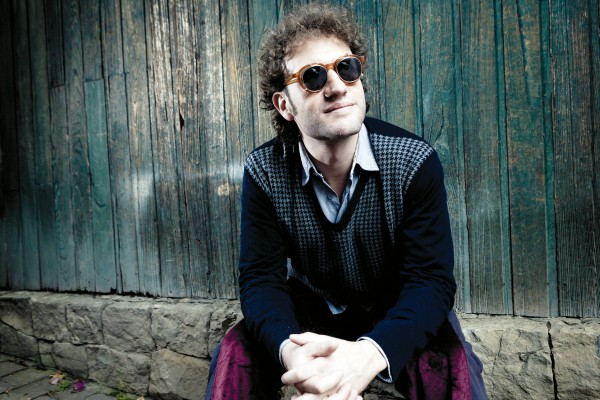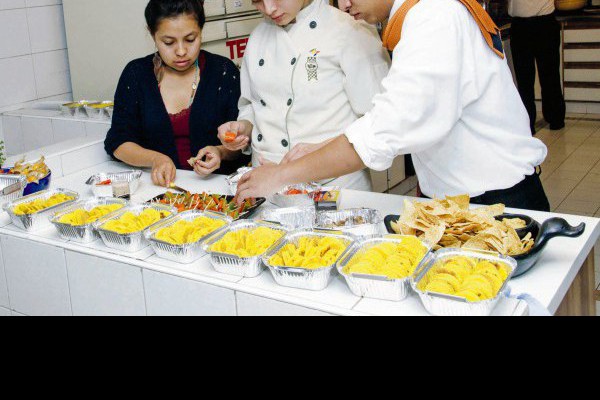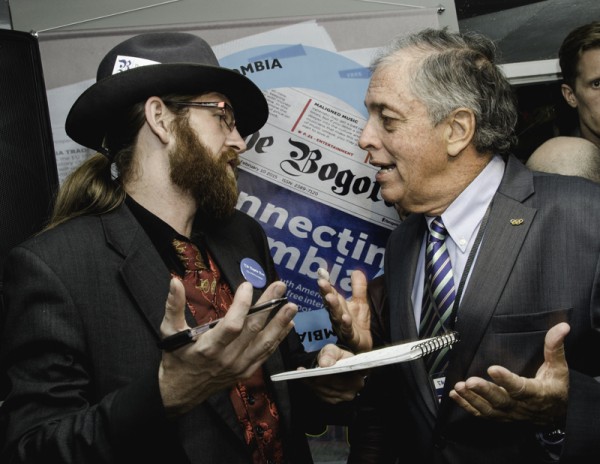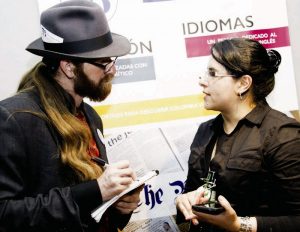 Amazingly, it’s been a full year since we launched the newspaper. None of this would have been anywhere near possible without the hard work and dedication of a number of people, not just the writers and contributors you see on our pages, but a myriad of other folk. Although we ran a front page full of thanks, we felt more were in order, and so we threw a bit of a party!
Amazingly, it’s been a full year since we launched the newspaper. None of this would have been anywhere near possible without the hard work and dedication of a number of people, not just the writers and contributors you see on our pages, but a myriad of other folk. Although we ran a front page full of thanks, we felt more were in order, and so we threw a bit of a party!
We were delighted that more than 150 people were able to come, and in keeping with the theme of the night – journalism through the ages – we asked our intrepid reporter Oli Pritchard to swap his bike for a trilby (or fedora for you North Americans) and press card and venture into the celebrations. Here are the results we found in the morning, pinned to the trilby – Pritchard himself nowhere to be found.
Folk had been mingling and mooching for a good two hours, but it was when the clock struck nine that the great and good of Chapinero gathered like the cloud on the cerros orientales to listen to the three designated speakers. First up was local luminary, President of Coldeportes and member of the International Olympic Committee, Andrés Botero Phillipsbourne, who spoke about his joy at watching the growth of The Bogota Post.
Following him was the managing director and co-founder of the paper, Emma Newbery, who got straight to the point about the challenges and rewards of the project – such as being forced to print the first edition earlier than expected, thanks to an exclusive interview opportunity with Northern Irish politician Martin McGuinness.
The speakers concluded with journalistic heavyweight Danghelly Zuñiga, director of the Journalism and Public Opinion programme at the Universidad del Rosario, who spoke about the need for a greater diversity of voices in the Colombian media scene.
As the speakers wrap up and the crowd dissolves away like sugar into a cheap tinto, I collar our hosts from Salón Comunal, who are only too happy to expound upon their thoughts on the evening.
I’m curious as to how they feel about this invasion of their space.
“It’s weird,” comments Bernardo Montoya, one of the gallery’s bosses, with a wry look.
Salón Comunal’s other manager Camilo Molano is more effusive: “After 12 or 14 events that we’ve run so far, this is the first time we’ve had so many people.”
Taking his cue from Camilo, Bernardo opens up: “The fact that you’re here is one of our goals. We want to be open, to involve people not just from the art world but from the whole city. This is a night that can help us expand our network and draw new interest from new people”.
Their friend María Juana jumps in: “This is so fantastic, I live here and you’re all welcome in my home”.
Camilo provides more detail: “Bernardo and I got together two years ago in the Los Andes University. I’m the business manager, he curates and makes all the artistic decisions. I’m just a facilitator, I support the project financially to allow the others to concentrate on art…”
“A friend, too,” María Juana interjects.
Camilo closes by saying: “It’s beautiful. We feel that you are so close to the ideas of Salón Comunal, our ideas. We’re making a community from a place, where we can bring together contemporary art, obviously, but also this foreign community. I see it as an alliance, we’re two organisations working together to create power, to achieve something special”.
On that note, I skulk outside like a cat feigning indifference, and accost Andrés Botero Phillipsbourne (see sidebar) for a photo with our Sports Editor, Freek Huigen and leading writer, Arek Peryt. Both of them seem pleased as punch, and Freek is quick to explain why he likes writing for the Post.
“It’s a great medium for expressing this current fashion for Colombian sports, not just here but abroad too. They’re really the positive side of Colombia right now,” he said.
Arek agrees: “It’s nice writing, too, genuinely readable and interesting, not just the usual stuff”.
Who then is the most important sports person at the moment? “James of course,” says Freek.
“But also Nairo – the whole Golden Generation!” interrupts Arek. “Henao, Rigo-gogo, this is the best group of domestic cyclists possibly ever!”
Fred Ellis, our resident expert on Bogotá’s underground scenes is standing in a corner like a hangover made flesh. I move towards him for an interview but am cut dead by an icy stare. Instead, I shake a few more hands, and look for a more willing interviewee.
Also out in the garden is Caroline Peña Bray, the artist whose work is on display in the gallery right now. She tells me, “This party is really interesting, it’s obviously a mix of different people, not what I might expect from a normal gallery night.”
With a smile she adds, “I’m privileged that you’re all here, to be honest.”
I ask if she minds this group of debauched hacks, drinking faster than the staff could cool the drinks, occupying her exhibition, but she is relaxed. “After all, art is nothing if we don’t share, and it’s good that journalism and art can share a space like this”.
With that, I slink off, like a grey-suited panther hunting sponsor-deer. The first I find to sink my claws into is Kirby Braddell of Pasea Travel, who has been with us from the start. Grinning like a cat who actually owns all of Cheshire, he’s more than ready to chat.
“I’m just so happy to be associated with this. It’s such a great resource, especially for expats, as Bogota’s one of those cities you have to get to know. The paper allows you to get more involved and not just be a superficial part of Bogota”.
Pasea most often operate up on the coast, so it’s a surprise to see the lad Kirby out of his Dreamland and in the big smoke. “I love the rural side of Colombia,” he says. “For me, it’s a chance to promote the less well-known but equally sexy parts of the country that very few foreigners have seen before”.
Talking of travel, I’ve just spied Azzam Alkadhi, our Travel and Entertainment Editor, nonchalantly sucking on a cigarette with General Manager Mike O’Brien and charming everyone in sight.
“It’s been hard work, but one of the most rewarding things I’ve ever done,” Azzam says.
Best moment? “Probably the Blunt interview … no I didn’t smoke a blunt with Blunt, but we did get up to a bit of mischief,” he adds, with a twinkle in his eye that sends me running for refreshments.
It’s not long before my Grolsch-boat washes me up in the company of one of the Post’s advertisers, Milagros Oliveros, from Sitel, who is only too happy to put her drink aside for a few minutes.
“I really like the paper, it’s something that wasn’t there before, so it’s really given us something new. I like the vision, especially the view of a Bogota that people are enthusiastic about, instead of complaints,” she says.
All well and good, but is it a viable business? “For sure. After we placed adverts we got many more resumés than before, so we’ve definitely seen an impact. We’re a call centre handling enquiries in English, Portuguese and French as well as Spanish, so we need to talk to foreigners. The Bogota Post helps us do that.”
Always nice to help and not hinder, think I, as I slink off to a dark corner, where News Editor Steven Grattan is laughing like a drain with contributor Daniel Steel. The two of them are shocked to see me presentable and behatted. “Working at the paper? Awful!” jokes Steven.
Lurking just behind them, I find a dashing chap I vaguely recognise. He turns out to be the effervescent Jairo Venegas. He is a man with many hats, not least among them the cap of wicketkeeper for the Colombia national cricket team! He chuckles as I recall how much I enjoyed the interview where he spoke of his pride at being the first Colombian to represent the country.
“Yes, that was funny, but true! I love rugby too, all the English sports,” he says.
It turns out that this Ramón from Tintin lookalike is not just crazy about sport but also… “Cider! Yes, I’m mad for cider. I really want to bring cider to Colombia, properly, which is why I’ve started making my own. At the moment I’m using imported apples, but I’m looking for an orchard to start local production”.
In fact, Jairo wasn’t the only man with alcoholic apples on his mind. We introduced him to the folk from Great British Cider.
I leave them discussing the idea of a Bogota Cider Festival, and saunter over to one of our biggest supporters, Daniel Warren, Director of the Centro de Idiomas at Universidad Sergio Arboleda. What does this former rugby hooker and soldier think of our English rag, I wonder.
“This isn’t NatGeo or Footprint or Fox news,” he says. “The bad news gets enough press, but living here you see something else. We have staff from 14 countries, they’re not naïve idiots and we want the truth”.
What’s the truth about taking adverts then, retort I! “Honestly? We’ve had a 400 percent increase in demand for our Spanish courses, so my only problem is finding new teachers.”
He adds, “We’re the only place in Spanish-speaking Latin America that is accredited by the Cervantés Institute, so we know we have the quality … the paper provides us with the perfect publicity platform to get that message out there”.
Back to the paper: “I love it! I support this dream, this inspiration that you guys had. You’re presenting Colombia in the right way. I love the Colombian community, and too often it’s shown in a one dimensional way,” he says.
 |
 |
| Toño Restrepo, DJ at the party“My heart was overflowing with the mood of the special moment we had – with all the incredible people that came from all over, playing some jazz, chill music, British pop, classic rock, world music, Latin music and some songs that mention newspapers! The party was simply fantastic and I would like to say congratulations to all The Bogota Post team for their first anniversary and wish them the best for the coming years.” | Catering by María Buenaventura“We wanted the food to transport people to the mountains and countryside of Bogota, to the early nineteenth century, when English explorers like Hamilton arrived and described their problems finding a good roast beef or some simple raisins. The waiters kept saying that the guests were incredible, the atmosphere was very friendly. One even found an English teacher!” |
With that parting comment I realise we are part of something special. Around me are the signs of a good evening had by all: bottles everywhere, people melting into the night like butter on a hot arepa and the only point of contention – the matter of where to go for the after party [Latora kindly settled the argument – ed].
The number – and quality – of people here is a reflection of what the paper has achieved. Not just us, the merry band of contributors, but also you, the readers. Your feedback keeps us going through those all-nighter production weekends, it keeps us on the right track and stops us getting lazy. A cliché it might be, but we would be nothing without you. See you at the next party?
By Oli Pritchard
Photos: Alexander Herrera

 Andrés Botero Phillipsbourne
Andrés Botero Phillipsbourne



















